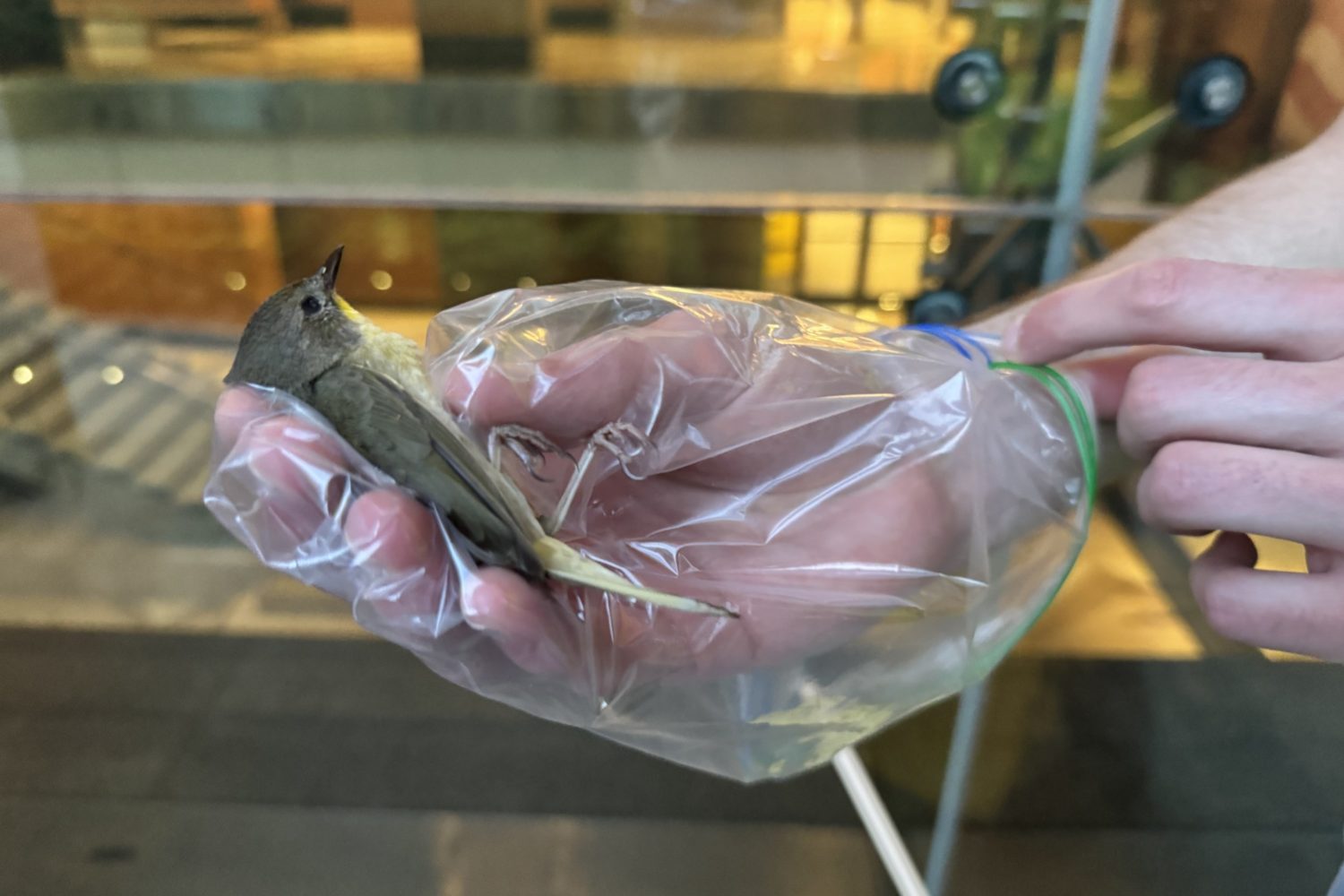Alvin, a sports bookie whose nickname, “The Little Jew,” seems flippant for a Holocaust survivor, had a feeling he was being set up. He had relied on his gut for almost 40 years in the business, but his uneasiness wasn’t going to keep him from collecting a debt.
Police had arrested Alvin seven days earlier on gambling and money-laundering charges. A federal magistrate had released the 70-year-old on bond on the condition that he cease all gambling activity.
Bad bet, judge.
Alvin rose early at his Potomac home, got behind the wheel of his new Infiniti, ran a few errands, bought $40 worth of lottery tickets, and drove to collect from a pizza-restaurant owner in Laurel.
“Hey,” Alvin said by phone to the bettor in his wise-guy accent. “You got the money? I’m coming by.”
The restaurant owner had been paying Alvin a couple of thousand dollars every few weeks on more than $300,000 in losses. The bettor would meet Alvin in a parking lot and hand him the cash through the car window. This time Alvin noticed that the man’s hands were trembling as he passed him four checks totaling $28,000.
As Alvin pulled out of the parking lot, flashing police lights blinded him. Nearly a dozen officers surrounded the car. Alvin sighed. His odds didn’t look good.
Montgomery County detective Mike Herbert had been planning the setup for weeks, offering the restaurateur a deal to call Alvin and arrange the meeting. He knew Alvin would be unable to resist.
Herbert had been trailing Alvin, posing as a bettor, watching Alvin launder money, and putting together one of the largest sports-gambling cases in suburban Maryland.
Alvin says the police who arrested him “trashed my car, made me take off my shoes, and searched me. They even took away my lottery tickets. I mean, I may have won a million bucks and never known it.”
I had set out to write an article about sports gambling in Washington. I knew getting in touch with former gamblers and therapists and lawmakers would be easy. Finding a helpful bookie would be a long shot.
I first learned of Alvin in a 100-word brief in the Washington Post about his going to jail for running a sports book. I called his attorney, Plato Cacheris, who has represented Monica Lewinsky, John Mitchell during Watergate, and Fawn Hall during the Iran-Contra case.
“Alvin doesn’t want the publicity,” Cacheris said. “You do what you have to do, but he’s not interested.”
I spent weeks following a paper trail—nearly 40 years’ worth of arrest sheets, legal documents, and newspaper stories. Alvin has ten convictions since 1969. Early in his career, Alvin ran a numbers operation. In the days before state-run lotteries, the numbers racket was a lottery-type game for the masses, and it sometimes was run by organized crime.
Alvin’s recent sports operation was more sophisticated. Alvin and his partners had been pulling in hundreds of thousands of dollars, taking sports bets illegally placed with an offshore Internet site but paying off and collecting on bets in person from clients, many of them wealthy, in Washington and Baltimore.
Finally I came across a document with Alvin’s phone number and left a message. For days I jumped every time the phone rang. One Friday he called and agreed to a meeting. We talked several times off the record. Finally he agreed to an interview on the condition that his last name not be used; he said he feared harm to his family.
I met Alvin at Timpano Italian Chophouse, a beige stucco restaurant on the edge of a strip mall on Rockville Pike. A large painting of Frank Sinatra hangs over a fireplace in the bar, which smells of peppers and sausages.
Alvin is a short, well-tanned man with silver hair combed Valentino-style. He usually wears a leather jacket, dark slacks, and Italian loafers. Police who searched his home say he is a clotheshorse “with more dry cleaning than most people have clothes.”
A federal judge sentenced Alvin to three years in prison in October for gambling and money laundering, but he didn’t begin serving his sentence until January. He spent the time as he usually did, hanging out with his buddies—most eligible for Social Security—at Timpano’s, drinking vodka with soda, eating meatballs and peppers, and reminiscing about things like wiretaps—he talks as if they come standard with every phone—crooked cops, and getting away. Alvin was involved in some famous police-corruption cases in the 1970s; instead of testifying, he told prosecutors to suck on a lemon.
When Alvin talks, he sounds a little like Joe Pesci from the movie Goodfellas. In fact, he tells stories about doing time with Henry Hill—on whom the movie was based—and John Gotti and about Jimmy Hoffa. He talks of seeing a guard’s throat slit in prison. Alvin looks younger than 70, but he has spent more than a decade in prison, and you can hear nearly half a century of numbers-running and bookmaking in his speech.
“If you’re going to stay in this business very long,” he says, “you gotta pay fast and collect slow.”
With Alvin, clichés—and image-spinning—abound: He’s a tough but kindhearted criminal who never broke a leg or even a knuckle; a down-on-his-luck kid who did what he had to do to support his family; a crafty criminal who never really hurt a soul. As it happens, much of what he says is true.
“There wasn’t any leg-breaking,” detective Herbert says. “We have not seen any evidence of any violence. There is a lot of intimidation, yelling and screaming, but in the DC area, violence just brings unwanted and unnecessary heat.”
Herbert says there is nothing to suggest that Alvin is connected to the Mafia.
“Alvin kind of fancies himself as this little Mafioso gangster,” he says, “buying drinks for everybody and things like that. All these guys feel a certain amount of power, and he likes it. Alvin gives off like he’s a tough guy, and he is a tough guy, but I’d be hard-pressed to say he’s Mafia.”
Instead of using his fists to collect, sometimes Alvin would let a player pay 30 cents on the dollar and was always willing to structure a payment plan. In this respect, he’s got more heart than MasterCard, and he never charged interest.
“The only gun I ever had was a little wooden rifle they gave me for marching when I was in the Navy in the 1950s,” Alvin says. “If the bettor don’t have the money, I’m not going to hound them or grind it out. What’s the point? Other bookmakers would complain I was ruining the business for them, but I’d try to make it as comfortable as possible for the customer.”
Then there’s the Holocaust, which, in Alvin’s telling, is a darn good story where even the Germans end up looking not so bad.
German Nazi forces occupied Alvin’s hometown of Vilna, Poland, just outside Warsaw, in June 1941, when he was six years old. Some Jews escaped the city, but Alvin and his mother, father, and uncle were forced into ghettos with about 60,000 remaining Jews.
One day Nazi soldiers rounded up a group of Jews, including Alvin’s family, lined them up in a shallow grave, and prepared to execute them. At the last minute, Alvin says, a friend helped Alvin’s family sneak out of line, and they fled toward some woods.
Guards saw the family running and opened fire. Alvin’s parents grabbed his arms and dragged him between them as they dashed toward the forest. Bullets struck and killed Alvin’s uncle. A shot grazed Alvin’s foot. Soldiers chased them into the woods, where Alvin watched his father kill one. They escaped.
Alvin and his parents traveled at night and spent the next year on the run in Romania and Hungary. One night, while they were sleeping on a German farm, soldiers came and searched the home. The farmer hid Alvin’s parents beneath a haystack and told Alvin to act deaf and dumb. The soldiers looked around and left.
“People always ask me if I’m still mad at the Germans,” Alvin says, “and I tell them that I’m not. Some of them risked their lives for me and my family.”
Eventually Alvin and his family made their way to a refugee camp in Italy, where they lived until 1946. Many of the refugees moved to Israel, but Alvin had an uncle in Washington, so his family decided to emigrate to the United States.
Alvin’s father ran a grocery store in Southeast DC. Alvin, the only member of his family who quickly learned English, stayed home from school to help in the shop.
Alvin was nearly 20 when he graduated from Coolidge High School. He worked briefly for his uncle at a wholesale meat company, then enlisted in the Navy and served two years. When he returned to DC in 1958, Alvin married and went back to the meat house. In later years he bought a gas station on the corner of Fourth and Florida, Northeast, operated a car wash where the Kennedy Center now sits, and sold used cars.
In the mid-1960s, Alvin met Sam Morgan, who had been in the numbers business in DC. Through the neighborhood and his father’s grocery store, Alvin knew people who wanted to play the numbers. Alvin was happy to take their bets and pass them along to Morgan. For a year they worked together. Then Morgan decided to retire, and Alvin bought the business from him.
“I thought it’d be an easier life for me,” Alvin says. “More decent hours. You know, there’s always risk. But I’ve always thought of it as it’s the cops’ job to arrest me, and it’s my job not to get arrested.”
How to make sense of the Holocaust survivor turned bookie?
“He has tried to essentially run from his pain . . . through living a more risky ‘do whatever it takes to survive’ lifestyle,” wrote psychologist John Gershefski in a letter to the court before Alvin’s sentencing. Alvin “has developed a strong, survivalist outer shell that may make him appear stubborn, and uncooperative. . . .”
Detective Herbert may have the best analysis of the cause of Alvin’s latest fall. “The big thing that undid Alvin,” he says, “was thumbing his nose at law enforcement. Once he knew he was under investigation and had already been arrested once, he kept on going. He was told to stop, and he didn’t.”
As Alvin sees it, he runs his business a bit like Nordstrom—customer-friendly, catering to people with a lot of disposable income. He counts lawyers, dentists, auto dealers, and country-club types among his friends.
He tells a story about a lawyer who owed him tens of thousands of dollars. Alvin told the lawyer he needed to stop betting and put him on a limit. Several months later, the lawyer quit betting altogether and sent Alvin a bottle of Champagne to thank him.
“Sometimes I’ll say, ‘Why you wanna bet? The odds are against you,’ ” says Alvin. “I don’t tell everybody that, but sometimes, sure, I approach it that way because if the person has the money, he’ll want to pay me so he can bet next week. I accommodate them any way I can. With me, the customer is always right.”
“One individual we interviewed,” says assistant US attorney Bryan Foreman, who prosecuted Alvin’s most recent case, “lost in the area of $700,000 in four months. And he paid.”
Detective Herbert says you can tell how wealthy some players are by how often they had to pay up.
“We’re not dealing with kids or blue-collar guys,” Herbert says. “There were some players who would tell Alvin, ‘Don’t bother me for $4,000 or $5,000,’ and their meet limit, which is when they’d have to meet Alvin and pay, would be $10,000 to $25,000. This is big business.”
It was players who led detective Herbert and assistant US attorney Foreman to Alvin. From 1985 through 1999, a group of men ran a sports-gambling operation out of a travel agency called Travel Whirl on Rockville Pike. Players would place bets over the phone and then collect their winnings or pay off at the counter of Travel Whirl. Many bettors belonged to Indian Spring Country Club in Silver Spring, Foreman says. A 1999 search warrant yielded a list of more than 200 bettors, many of whom were sub-bookies with 10 to 20 of their own players. Police arrested the leaders of the operation, who went to prison.
“Once they were busted,” Foreman says, “some of the larger players moved to Alvin’s operation. The information we received from players was that Alvin put the word out on the street that they were going to take the operation offshore.”
With a legion of bettors, Alvin was poised to run a large-scale sports book. Though police are not sure how, he hooked up with people who operated a gambling Web site on the Caribbean island of Dominica, where betting is legal. The Web site charged Alvin $35 for each of his players who used it.
In the United States, the only legal place to take or make a sports bet in person or online is Nevada. It is illegal to bet via any of the Internet sites originating from foreign countries where sports betting is legal.
Alvin’s players would place their bets online, then Alvin would meet them in person to pay or collect. Police found a ledger sheet showing that Alvin’s operation netted $330,000 for a week in December, according to court documents.
But Alvin says he never made much profit. “All the money you take in is for your bank in case you lose,” he says. “The only day you make any money is the day you quit.”
Herbert says Alvin’s claim is ridiculous.
“In ten years of doing this, I’ve never met a bookie who says they made any money,” he says. “But you know what? Alvin doesn’t have a job, he lives in a townhouse in Potomac, his wife drives a Mercedes, and he drives a brand new Infiniti. The house is decorated very nicely. You know if you’re living like that and you’re at Timpano’s five nights a week buying everybody drinks, somebody is making money.”
Police first arrested Alvin in 1968, when he was 33 years old, on a charge of making false statements to the Department of Housing and Urban Development. No detail is available except that he received three years’ probation, according to court documents. It was the beginning of a nearly 40-year relationship with local and federal authorities.
“One of the funniest stories is when the feds wiretapped me in 1969,” Alvin says. “We had a guy at the barber shop inside the Supreme Court, and the barber would call us for customers playing the numbers who worked there at the court. And the feds, they thought it was the judges playing. I never knew the clients—it was probably just janitors—but the FBI was going nuts, and they just knew we were paying judges, but we weren’t.”
Two years later, police in Philadelphia arrested Alvin and Rocco P. Fanelli of Staten Island on charges of conspiracy in connection with the interstate transportation of $2.8 million in forged IBM stock. Alvin received a four-year prison sentence.
Before he began serving it, Alvin was involved in one of the largest police-corruption probes in DC history. He was one of 23 people, including 11 cops, indicted by a grand jury in 1973. Alvin was charged with bribing a public official. Police lieutenant Harold F. Crook testified that Alvin initially approached him at a police station and began paying him $200 a month to protect Alvin’s numbers operation from being raided. Crook also testified that Alvin delivered payoffs from at least one other gambler.
Alvin pleaded guilty and received another four-year sentence. He also pleaded guilty to unrelated federal gambling charges stemming from an investigation in Baltimore, for which he also got four years. Both terms ran concurrently with the four years Alvin received for the securities charge.
Meanwhile, the Justice Department’s cases against the other gamblers and police officers began to fall apart. Alvin refused to testify. Without his testimony, several people were acquitted, according to news reports. Alvin’s attorney argued that Alvin had the right not to testify for fear of retribution. One prospective defendant already had been murdered, and a gambler who became a government informant allegedly had been kidnapped a week before the trial and later testified on crutches.
The judge sentenced Alvin to an additional six months in prison for contempt.
While serving his sentence at Lorton, Alvin was given permission to go to synagogue Friday and Saturday evenings in Silver Spring escorted by a guard. It didn’t last. He was charged with escape for allegedly bypassing the temple and instead visiting his girlfriend, his parents, and various restaurants unaccompanied by a guard. The charges were dismissed, but Alvin was moved to the storied prison in Leavenworth, Kansas, where he stayed in the cell occupied years earlier by Robert Stroud, who later became known as the Birdman of Alcatraz.➝
In 1980 Alvin spent six more months in prison for bookmaking. But he soon had another sports book up and running.
“When I came home,” Alvin says, “I wasn’t doing anything for a while. Then football season was coming, and some old football customers were calling me from when I used to take a couple of bets. I keep coming back to bookmaking for the money. I mean, I’ve got bills to pay like everyone else. To me, it’s just a job, a business.”
Alvin and a partner ran the gambling operation off and on for almost a decade. Then in August 1990, police arrested Alvin on charges of possessing five kilos of cocaine with intent to distribute. “It was never my thing,” he says. “You know, I did a favor for a friend and got caught.”
Says prosecutor Foreman, “We got information that the cocaine case was Alvin’s attempt to . . . get an infusion of capital and start up a large-scale bookmaking operation.” Whatever the case, Alvin was sentenced to ten years in prison.
He got out in 1999. Three years later detective Herbert became aware that Alvin, to no one’s surprise, was back in business.
In ten years of investigating bookies, detective Herbert and assistant US attorney Foreman say, they never saw an operation like Alvin’s. It combined the new technology of offshore Internet wagering with old-fashioned face-to-face collection.
“Some of Alvin’s appeal was that there was direct contact for the players with a person,” Foreman says. “In this industry, it’s always a question of are you going to get paid if you win, so people felt comfortable knowing the folks they were dealing with.”
Players could get the point spread and place their wagers online. Alvin gave each player a password to the Web site. The passwords were also used to keep track of bettors’ winnings and losses. Every Tuesday, the people in Dominica would send Alvin a fax showing where all the players stood.
But Alvin’s business had additional benefits. Because players made bets on the Internet, they could wager 24 hours a day without having to track down their bookie. And Alvin could truthfully claim that he never took a bet.
“Even players tell us they never placed a bet with him,” Herbert says, “but I always ask them, ‘Who’s your bookie?’ meaning, ‘Who do you pay when you lose?’ They all say, ‘Alvin.’ ”
When it came time to collect or pay out, Alvin says, he met bettors at restaurants or their businesses or homes. Police say Alvin met most players at Timpano’s, but Alvin says he never did business there. He never raised suspicion by operating in public.
“Because it’s just sports betting,” says Herbert, “it doesn’t raise eyebrows. It’s just a bunch of guys drinking and talking about sports. It wasn’t cloak and dagger.”
Unlike many online betting sites where bettors pay by credit card, in Alvin’s operation the money stayed in America and was paid in person. Keeping the money on US soil had big advantages.
“One of the issues is always how to get the money back from the islands,” says Foreman, “and I don’t think [Alvin] had a real comfort level with that. . . . They were aware that banks have to issue currency-transaction reports for any transaction over $10,000. So wiring the money was problematic, and they recognized because of their experience with illegal narcotics they couldn’t fly the money back because they were going to be targeted. And that’s why they kept the money in the states.
“We know Alvin was not the mastermind behind this,” Foreman says. “He is not computer-savvy at all. Somebody else was working the operation, and the investigation is still continuing.”
At the time the Internet site was operating, Alvin’s longtime associate David McGowan of Chevy Chase was running a smaller sports book. McGowan, who had a record of drug and gambling charges, was prosecuted alongside Alvin. After cooperating somewhat with the government and pleading guilty to gambling, McGowan, who declined to be interviewed, received five years’ probation.
“The island operation was for bigger players,” says detective Herbert. “And some of the lesser players didn’t want to mess with the islands, so that’s where McGowan comes in.”
On Saturdays, Sundays, and Monday nights McGowan sat at home answering the phone and writing down bets. Then he would go to area bars to pay or collect. Soon Alvin was putting his smaller bettors together with his old acquaintance. Likewise, McGowan connected Alvin with his big bettors, says Herbert.
“The operations complemented each other,” Herbert says. “Alvin had a part of McGowan’s operation, and McGowan had a piece of Alvin’s.”
When police served a search warrant on the two men’s homes in early 2004, they found a list of more than 300 bettors, Foreman says. Herbert says the two men could have been taking bets from almost three times that many people because of their franchise operations. “They were the bookies to the bookies,” Herbert says. “I firmly believe they had thousands of players.”
Alvin went around to bars and wooed other bookies, telling them to introduce their clients to him. Then the bookies had only to pay and collect. Alvin would take a percentage, but the bookies no longer needed to take the bets or work as much. Moreover, Alvin bankrolled the operation and assumed the risk. In the end, scores of players had no idea they were betting with Alvin.
“By doing this,” Herbert says, “Alvin’s territory spread. He was in Virginia, DC, Baltimore, and as far away as Kokomo, Indiana.”
Most bookies work only six months of the year. Particularly in the Washington area, football reigns supreme, followed by a betting flurry during the NCAA March Madness basketball tournament. Most bets are made on televised football games—both pro and college—but other than the basketball tournament, most bookies don’t want to take bets on other games.
“Regular-season basketball isn’t worth it,” says Herbert, “because you have to work every night. Most players don’t bother with basketball anyway, and baseball betting is almost nonexistent. After football season around this area, business drops off. So you make enough in the fall to last all year.”
Foreman says area betting is heaviest on Redskins games.
“I don’t know if you get more casual bettors or if you get people who think they’re savvy and know the team and think they’re not going to cover [the spread],” he says. “I know that when Joe Gibbs came back, there was a noticeable increase.”
He also says the Internet is not hurting bookies.
“Alvin paid $35 for each player to use the Internet,” he says, “but before, you had to pay someone $500 to $1,000 to answer the phone and take down bets. It’s a lot cheaper now to run an operation.”
A one-man bookmaking operation with 25 clients can net about $50,000 a year in cash, Herbert says. Few gamblers fare as well. After all, Alvin explains, “as a player, you have to pick right about 63 percent of the time to come out ahead.”
Still, Alvin insists that the job sometimes seems like more work than it’s worth. “You always end with an ulcer. It can be a lot of aggravation. You gotta be a banker and a psychologist.”
In late 2003 and early 2004, Alvin had become a regular at a Langley Park liquor store that cashed checks. It was frequented by day laborers; most customers would show up on Fridays to cash their checks, worth usually about $500. It was a profitable business for the store, which charged 1 percent for cashing a check. It was even more profitable when Alvin showed up.
“Alvin would call the store in advance to make sure they had enough money,” says detective Herbert. “Then the store would call me. He’d come in with four or five checks for $70,000 or $80,000 at a time, about once a week or so.”
The checks were made out to “Cash” and to fictitious names and businesses.
“One thing liquor stores won’t do is cash third-party checks,” Herbert says, “but they did for Alvin. The store would let me watch on their security camera, and I’d watch him scratch a fake name on the back of the check, take the cash, and leave.”
Sports gambling is a 70-percent cash business, yet police had more than $1 million in checks, “which shows the dollar amounts involved,” Herbert says.
Foreman says at least three people helped Alvin launder his money through the liquor-store and bank accounts.
One time, Alvin paid the owner of a bank account 2 percent of $123,309 in winnings for allowing Alvin to deposit the money into the account. Most of the money was withdrawn through a series of checks payable to fictitious names and cashed by Alvin, according to court records.
Prosecutors also alleged that McGowan was involved in the laundering schemes. In January 2004, authorities seized more than $103,000 from a Navy Federal Credit Union account that McGowan controlled. McGowan says the money was improperly seized and that it legally belonged to his wife; law-enforcement officials say the money was deposited from Alvin’s winnings. McGowan also allowed Alvin to use a bank account his mother owned, Foreman says.
In the end, it was Alvin’s indifference as much as his lawbreaking that rubbed detective Herbert the wrong way and landed Alvin in trouble again.
“He knew he was under investigation,” Herbert says. “It burned me that he was still out there making tens of thousands of dollars a week. I wouldn’t be able to sleep at night, but he’s doing business as usual.”
To Alvin it seems like no big deal.
“Who did I hurt?” he asks. “All I’m doing is providing people with entertainment. In the end, I feel like I’m the victim.”
Alvin does not see himself as a problem. He does not see how his earnings—sometimes hundreds of thousands of dollars from a single bettor—might have placed families, marriages, and livelihoods in jeopardy.
Yet Alvin has his supporters. Before the sentencing in October, nearly a dozen longtime friends wrote the judge on his behalf. Letters came from Dudley Dworken of Curtis Chevrolet, attorneys James Farmer and Burton Liss, and Harold Smith, manager of Indian Spring Country Club. They characterized Alvin as “charitable,” a “gentleman” who would “take the shirt off his back” to help someone.
In his report to the court, psychologist John Gershefski wrote of Alvin’s childhood experiences during the Holocaust. “In essence,” Gershefski wrote, “he has been trying to tell his story without feeling safe enough to do so directly. . . . Re-creating one’s early trauma in a way that gives an illusion of mastery, that is usually doomed to not succeed, is a very common attribute of a trauma survivor. In essence, his lifestyle and the inevitable legal tanglings and facing prison life is his re-creation” of those traumatic times.
On January 9, Alvin began a three-year prison sentence.
“I’m okay with going to prison. You know, I’m gonna lose 15 pounds,” he says. “For me, it’s not so difficult as for others because I enjoy reading. The day doesn’t do me, I do the day.”
Wherever he is, Alvin is at the center of his own moral universe.
“I want to be remembered as a good, honest person,” Alvin says, “I never cheated anyone. I try to live by the rules.”
But they are Alvin’s rules.
“Let’s face it,” he says, “who did I really harm?”
The ABCs of Sports Gambling
Betting on sporting events is legal in the United States only at licensed sports books in Nevada casinos, which means it is illegal to bet on games with a bookie at a Washington bar. Internet wagering is more complicated.
It is illegal to operate an Internet sports book in the United States. The federal government says it is also illegal to run an online sports book offshore and take bets from US citizens. The Department of Justice considers gambling to have occurred both where the gambler is and where the gaming business is, even if the Web site is offshore.
It’s hard to tell how many people bet on sports. Sports Illustrated in 2003 said that Nevada sports books took in $110 million in revenue, and offshore Web sites took in an estimated $1 billion—up from $200 million in 1997. According to a 2003 article in the Duke Law and Technology Review, online gambling sites worldwide won $4.1 billion from bettors, with the US accounting for more than half of that.
Players are supposed to report gambling winnings to the IRS. If you win more than $10,000 at one time in Nevada, you have to fill out IRS forms at the collection area.
Players at Nevada casinos can bet on practically any sporting event. Most bets are on football, basketball, boxing, baseball, and hockey. When betting with an illegal bookie, there may be fewer options. In the DC area, many bookies do not accept wagers on baseball or regular-season basketball games. Alvin’s operation was unique in that players could place bets on virtually any sporting event, even NASCAR races.
Most sports bets are based on “the spread”—the point advantage given one team over the other. Say Washington is playing Baltimore and the point spread is Washington minus seven. If the bettor takes Washington, the team has to win by more than seven points for the bettor to win.
Point spreads are a way for the sports book to try to balance the number of players betting each team. If the bookmaker can achieve equilibrium, he is guaranteed to make money because losers pay off the winners—and give the bookmaker another 10 percent of the bet. This is called the “juice” or the “vig” (for “vigorish”). Point-spread bets are essentially 11–10 bets. If you bet $500 and win, you collect $500. But if you bet $500 and lose, you have to pay $550. In case of a tie, no money changes hands.
Other kinds of bets include the proposition bet—when someone bets, say, on how many touchdowns a quarterback will throw, how many rebounds a basketball player will get, and so on. Most of these bets are offered at 11–10 odds but can vary depending on the bookmaker.
An over/under bet is based on the total number of points scored. As with a point-spread bet, a number is posted before the game, and the player bets on whether the combined points of both teams will be over or under the posted number. These bets are usually 11–10 odds. Betting the over is called “betting on the ball”; betting the under is “betting on the clock.”
A parlay bet is wagering on two or more events and getting higher odds than betting on the events separately. The player must win all the games to collect.

















